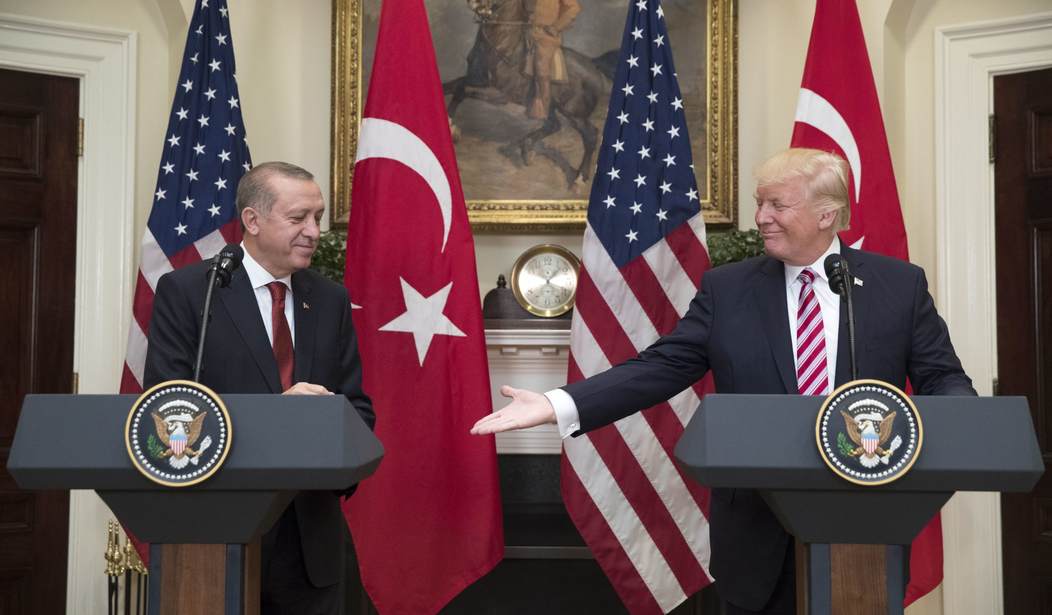On Monday, a CBS News contributor reported that President Donald Trump encouraged Turkey’s authoritarian President Recep Tayyip Erdoğan while upbraiding America’s other NATO allies. He had called on NATO allies to contribute more money to the common defense, and only Erdoğan could unilaterally make the pledge.
“Trump was very frustrated that he wasn’t getting commitments from other leaders to spend more, and many of them said, ‘Well, we have to ask our parliaments, we have a process, we can’t just tell you we’re going to spend more,'” Ian Bremmer, president of the Eurasia Group and CBS News senior global affairs contributor, told CBS News on Monday.
“Trump turns around to the Turkish President Recep Erdoğan, and says, ‘except for Erdogan over here, he does things the right way,’ and then actually fist-bumps the Turkish president,” Bremmer recalled.
It makes sense for Trump to ask NATO allies to contribute more to their defense, but he should not have encouraged Erdoğan.
In a controversial referendum last year, the Turkish president won unchecked supremacy and secured the abolition of the post of Prime Minister. He won another 5-year term last month, and on Sunday Erdoğan moved to clamp down on the military.
This is a tremendously important move. When Mustafa Kemal Atatürk established the secular state of Turkey, he set up the military as a final check on any Islamist takeover of the government. Military coups ironically were a system to prevent authoritarian Islamist rule, and they corrected Turkey on numerous occasions.
Erdoğan leads the Islamist AKP party in Turkey, and he successfully prevented a coup in 2016. The move on Sunday”demonstrates that the government now has full control over the armed forces,” Ziya Meral, a researcher at the British Army’s Centre for Historical Analysis and Conflict Research, told the Financial Times‘s Laura Pitel. “The coup attempt and those behind it — and that era of military takeovers — has now gone.”
Erdoğan made another historically important move in 2016, reclaiming the Hagia Sophia for Islam. The Hagia Sophia was built as a church, but the Ottoman Empire transitioned it into a mosque after the fall of Constantinople in 1453. Under Atatürk, the building was turned into a museum, to commemorate both its Christian and Islamic heritage. I visited it in 2011. By reclaiming the building for Islam, Erdoğan sent a clear message.
Just last month, the Turkish president announced he was expelling the ride-sharing service Uber from the country, declaring, “That business is over.”
Congress, the United States Commission on International Religious Freedom (USCIRF), and other Americans are also pressuring Turkey to release American pastor Andrew Brunson, who has been imprisoned more than 500 days under charges of terrorism.
According to the Christian persecution watchdog Open Doors USA, Turkey is the 31st worst country for Christians, with Islamic oppression preventing Christians from worshiping freely. Christians have been banned from state jobs, and experience discrimination in private employment as well.
Furthermore, Turkey has long fought against the Kurds, a people group in eastern Turkey and northern Iraq with an impressive dedication to secular and representative government. Some have alleged that military strikes Erdoğan launched against the Islamic State (ISIS) were really a smokescreen to attack Kurds.
As Bremmer told CBS News, after Erdoğan’s “executive presidency, the purges that have gone on internally, Turkey is hardly a liberal democracy at this point.”
Is Erdoğan really the man Trump wants to fist-bump?









Join the conversation as a VIP Member